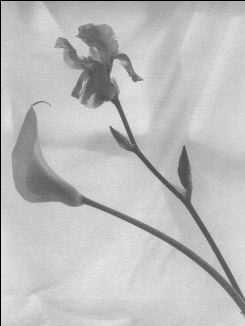Kentmere Art Classic
Reviewed by Les McLean
Kentmere, photographic paper manufacturers based at Staveley in Cumbria, on
the southern fringe of the English Lake District,
have produced a comprehensive range of papers for many years. In addition
to the traditional fibre-based and resin coated papers they have produced tinted
monochrome papers and lightweight document art paper. The latest addition to the range
is Art Classic, which is a textured paper with a matt finish that comes in
one grade only (I will comment on this later). The paper is similar in
weight to Kodak Elite, therefore is quite robust and handles well at both
wet and dry stages.
Art Classic resembles a heavy watercolour artist's paper in feel, and is
suitable for special after-treatments including colouring and some
pigment processes. It is however supercoated, and can not be used in
place of a hand-coated watercolour paper.
I used three developers to explore both the contrast control and image
colour of Art Classic. They were:
- Dektol diluted 1:1 instead of the
normal 1:3
- OD62, which is a developer I make up from a formula which is
provided with Oriental Seagull paper, diluted 1:2 which is
normal
- Selectol Soft diluted 1:2 in order to
make it very slow working and much softer than normal
I chose three
negatives for the test, one high key still life, one low key still life
and a low key portrait. We have reproduced only the high key still life
here in PHOTON, as it is the best suited to computer display.
All prints were developed for three minutes.

When placed in the developer the image appears after about 30 seconds
and continues to develop steadily until the last 40/60 seconds, when
development seems to speed up. The negatives I chose to print would
normally have been printed on grades 2, 3 and 4 had I been using graded
paper. However, all printed reasonably well on Art Classic although I
carried out more manipulation than I would normally have done. When
compared with graded papers I think that Art Classic is about equivalent
to grade 3 Record Rapid. The use of different developers at various
dilutions will enable grades 2 and 4 to be achieved. I would strongly
recommend that this should be tried if you decide to use this paper.
A sectional reproduction of the scan (made on a Sharp JX-600) at full size will
show you the texture of this unusual paper pretty clearly. Just click on
the scan to view .
Print Colour
Dektol gave the coolest print colour and the strongest tonal range whilst
OD62 gave the warmest. Selectol Soft produced a most pleasing result on
the high key print as well as a warmish colour. Art Classic is a paper
that is receptive to the manipulation of image colour in many ways, first
of all by use of different developers or a combination of more than one
developer, secondly by using toning baths such as selenium. I found that
the natural colour of the image tended always to be on the warm side, no
matter what developer was used. Toning in selenium cooled the image a
little as well as intensifying the blacks which increases the contrast of
the final print.
Drying
Because of its weight, Art Classic dries well either by air on a drying
rack or by heat on a flat bed dryer, although I only use heat when I have a
deadline to meet.
Conclusion
Before I carried out the careful tests described here, I did make some
quick prints on
Art Classic at the end of a morning printing session. I have to say that
they were less than satisfactory in that two of the three prints made had
strange oily marks on them and the third had uneven streaks in an area of
grey sky, and I know that particular negative prints perfectly on my normal
paper.
However, after completing the formal tests I felt somewhat happier
when I assessed the results. I had no strange marks or streaks and felt
that Art Classic could prove to be paper that may have a place in my
darkroom. It is not a paper I would choose for general use, but I do think
it could be useful for the print that needs a different treatment to
communicate the message.
Editor's Postscript: while Les found this 'ready-made hand coated' art
paper no match for the quality he looks for in his glossy unglazed
fibre-base prints, I commented that to the punter buying a framed art
print in a gallery, the final result looked less like an ordinary
photograph and more like a handcrafted print. We chatted about this
aspect, and Les had to agree that the tactile/visual aspect of Art
Classic could improve print sales. That's how we ended up with one his
test prints on the office wall...
- For further information about Kentmere click here
- Return to Darkroom Features index
